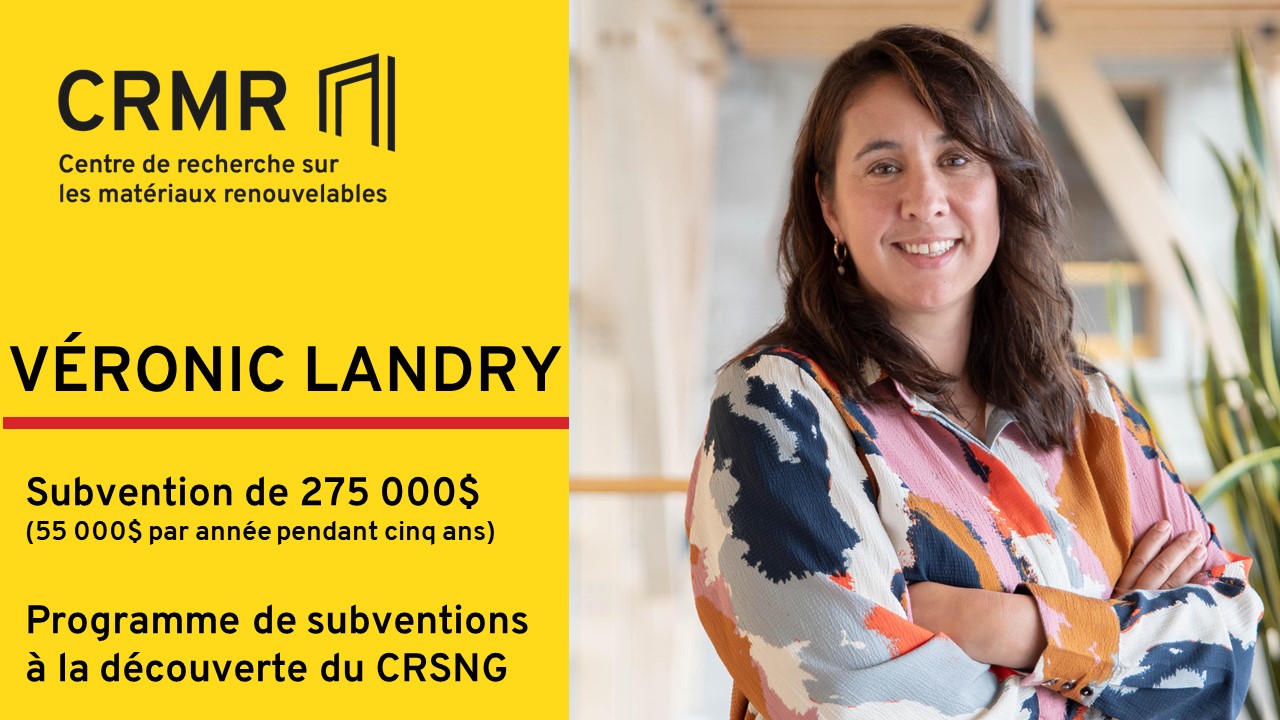Véronic Landry, a leading researcher at Laval University, was recently awarded a $275,000 grant over five years as part of NSERC’s Discovery Grants program!
Congratulations to Véronic Landry, professor at the Faculty of Forestry, Geography and Geomatics at Laval University (FFGG) and director of the Renewable Materials Research Centre (CRMR), on winning a grant from NSERC’s Discovery Grants program. Her project, entitled « New-generation polyelectrolyte complexes », will receive funding of $55,000 per year for five years from the Natural Sciences and Engineering Research Council of Canada (NSERC). This program aims to deepen our understanding of polyelectrolytes (PECs) and explore the underlying mechanisms that enable their complexation, stability, and performance.
This funding is of paramount importance, as it will not only pave the way for future applications by facilitating the creation of thick layers and durable surfaces, thus promoting innovation in the field of renewable materials, but also provide a valuable research opportunity for three students in wood and bio-based materials engineering at Laval University. This promising project will enable significant advances in the field of sustainable, low-environmental impact construction, reinforcing Université Laval’s position as a leader in this field. Congratulations, Véronic, on this remarkable achievement!

Project details
Short-term objectives :
- Develop in situ complexation strategies (porous material) to enhance the efficiency of applying thick films of PECs.
- Integrate complementary cross-linking processes to improve the durability of PECs, exploring methods compatible with porous materials like wood.
- Deepen understanding of the complexation/polymerization mechanisms of PECs within wood, focusing on molecular interactions and factors influencing complex stability.
Long-term objectives:
- Apply advancements in complexation and durability to develop high-performance coatings and impregnation products for wood.
- Utilize knowledge on PEC complexation and durability to enhance the mechanical and thermal properties of polyurethane foams, vapor-barrier membranes, and other building materials.
- Transfer knowledge to other sectors such as automotive, aerospace, and biotechnology.
Research Methodology
The proposed research program will be divided into three projects: two doctoral (PhD) and one master’s (MSc). Additionally, two undergraduate students (ETS) in wood engineering will participate, collaborating with graduate students to share expertise.
- Project 1 (PhD) will focus on « Fire-resistant complexation strategies: optimizing films for porous materials and thick films » and aims to develop one-step complexation strategies to address the challenges of film formation inside or for thick films.
- Project 2 (PhD) will focus on « Strategies for improving the durability of PECs ». The aim is to improve the durability of PECs by exploring two approaches: mechanical performance through frontal photopolymerization and water resistance with wax emulsions.
- Project 3 (MSc) aims to « study material complexation and improve the durability of treated wood: impact on fire performance and mechanical properties» . It will aim to assess the potential of complexation and durability strategies within wood, particularly about the fire performance and mechanical properties of treated wood. Two wood species will be tested: white pine (Pinus strobus, softwood) and sugar maple (Acer saccharum, hardwood).
Project benefits
The spin-offs of this program will be visible in both academic and industrial circles:
- Training of HQP and dissemination of results – This program will train undergraduate and graduate students in emerging areas of wood and materials engineering (PECs, low environmental impact solutions, flame retardants). The work generated will enable at least 7 scientific papers to be published and 3 international presentations to be made. Results will be disseminated at research center symposia and industry networking events.
- Building knowledge – This program will generate fundamental and applied knowledge on various polyanion-polycation couples suitable for a variety of substrates, with a focus on the development of flame-retardant solutions.
- Product development opportunities – The global market for flame retardants, estimated at $8.63 billion in 2022, is expected to grow at a compound annual rate of 7.1% from 2023 to 2030. In addition to wood, flame retardants are used in the manufacture of electrical and electronic equipment, the construction sector, transport vehicles, furniture, and upholstered items. With over 200 scientific papers on flame-retardant PECs published by 2022, the knowledge generated will be of interest to many sectors.
- Opportunities for commercializing the work – The work will be presented to partners of the Consortium sur les produits composites en bois and the Chaire de recherche industrielle sur la construction écoresponsable en bois. The partners (30) could benefit from this research, strengthening links between academia and industry and supporting innovation in Canada.
- Environmental benefits – The solutions developed will increase the potential markets for wood products, the only renewable construction material with low environmental impact. This will help reduce the environmental impact of buildings.

